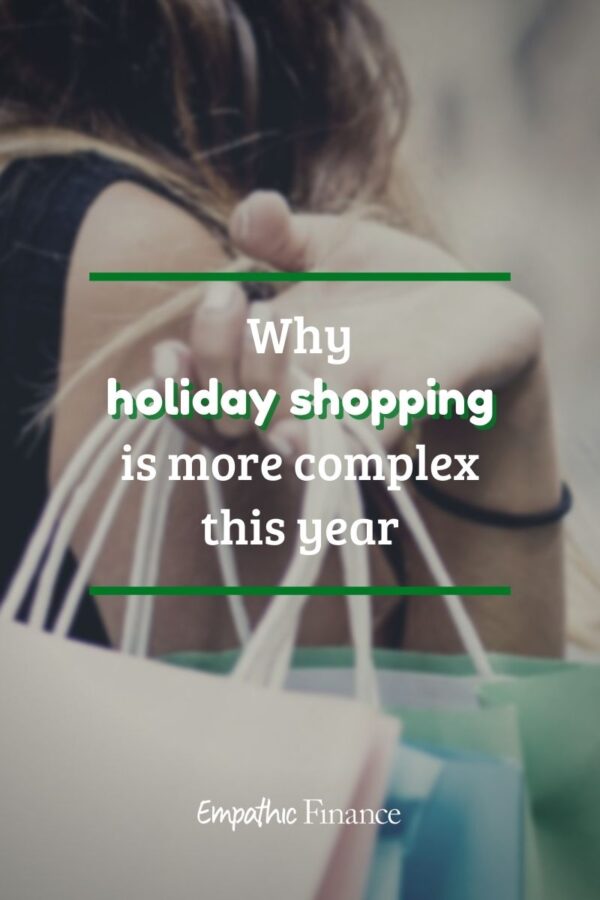Black Friday deals have a greater urgency this year because of the pandemic, but it doesn’t mean that you should do your holiday shopping indiscriminately.
I can’t lie; I’ve always had challenges with this time of year.
It’s not the holidays, which are fine however you celebrate them, but the shopping part: Black Friday, Cyber Monday, Empty Your Wallet Tuesday. Pretty much the entire season between Thanksgiving and Christmas.
This year, I’ve received roughly 2,100 emails advertising a 20% off coupon (“THIS WEEKEND ONLY!“). And that’s fine, of course; there’s nothing wrong with having a sale. I’ve contemplated having a sale on my own course, Take Control of Your Money Story, as it could help you manage just these sorts of situations.
But as someone who is focused on people’s feelings of financial empowerment and is attuned to the trappings of envy and jealousy, this season, with its focus on shopping, is summed up by the phrase: here be dragons.
I’ve always been uncomfortable with giving into spending much of anything on Black Friday. In years past, I’ve promoted it as “Buy Nothing Day”.
And why not? Do you really need to buy things between the day after Thanksgiving and four days after Thanksgiving?
Of course not, though the deals can be compelling.
But this year holiday shopping feels more complex, because, of course, like everything else, of the pandemic.
(Note to my fellow Americans: we are still in a pandemic.)

Table of Contents
Uncertainty in the economy
Since May, Eater has documented a list of Portland’s closed restaurants.
It is a list of heartbreak. Beech Street Parlor, a cozy house-turned-bar full of dimly lit nooks. Back to Eden, with its soft-serve and delicious sweet treats. Townshend’s, my first Portland coffee shop hangout when I moved here. Tube, the only club downtown where I didn’t feel like a tool, and that served a surprisingly good $5 vegan banh mi.
Even places I never went to, like Pok Pok or Canton Grill, having closed makes me sad.
Our economy thrives in certainty, and there is no certainty out there. No one is traveling (or rather, no one should be traveling), but even in things we can do, many of us are holding off, waiting to see what happens next.
Will we still be in quarantine in 2021? For the first few months or the whole year?
Will you still have your job? Will you get a new one after being out of work?
Because of all this, people are withholding purchases. I know I am.
The problem is that many businesses can’t handle these pauses in the system.
We can debate why that is. Whether businesses took on too much debt, or if they didn’t operate with enough of an emergency fund, or whether we have the most incompetent, heartless and brainless government in the world.
But none of the matters right now. In September, we learned that 60% of temporarily closed businesses are now permanently closed. That number isn’t going to go down.
Shop for America
George W. Bush is famously, if slightly inaccurately, known for imploring people to go out and shop in response to the terror attacks of 9/11. The point was that people should go about their normal way of life as a protest against foreign aggression.
Should we be doing the same thing now? Is it our, dare I say, patriotic duty to spend on Black Friday, or spend extra money throughout the holiday season?
I mean, obviously we know that Amazon or any of the big chains don’t really need our money. So it’s certainly no mitzvah to buy something on Prime.
But what about smaller businesses? Isn’t it the right thing to do to purchase items from those shops (online or curbside pickup, of course)?
No, it isn’t. Or rather, purchases aren’t inherently good or bad, right or wrong.
Sorry.
What is the right thing?
The point isn’t to spend less, the point is to spend intentionally, and within the guidelines you have set out for yourself.
If the above sounds harsh, it’s only to shake you out of a mindset, one that says that “buying equals a good thing”. It’s very easy in this holiday season to get into that mindset, and it will not serve you well.
But I’m not telling you not to spend money either. And I certainly don’t want you to associate spending with doing something bad.
Buying stuff, even for others, feels good, and so we want to do lots of it. And if we can find a moral high-ground (“it’s helping the economy!“) then that means that we’re more likely to lose focus on the personal decision-making process.
And why do we buy? For many reasons. To feel better. To help others. To signal something about ourselves. These are all very powerful impulses, and I don’t want to denigrate any of them.
But that’s why it’s so important to remain vigilant, and understand why you’re making the purchases you are. The point isn’t to spend less, the point is to spend intentionally, and within the guidelines you have set out for yourself.
If you don’t have strong internal guidelines, this can be a difficult time for you. (Though I can definitely help with that.)
In general
I would hold off on Black Friday sales. If you’ve already had a plan to purchase something, and it’s 20% off, sure, that’s totally fine.
But if you’re trying to support local businesses, remember that you can help them more by paying full price. If that makes you less likely to purchase, you may want to ask yourself why that is.


